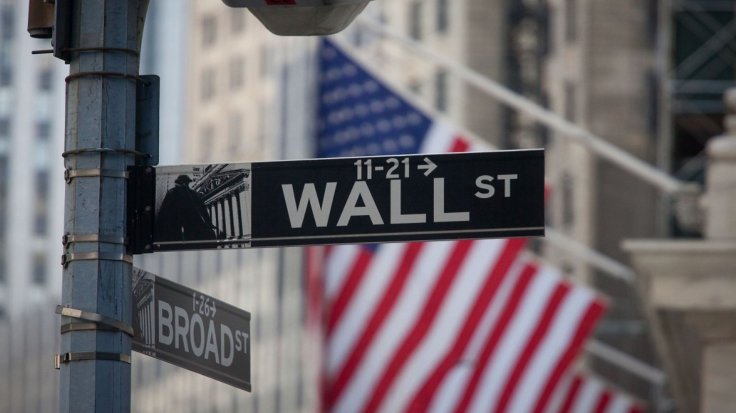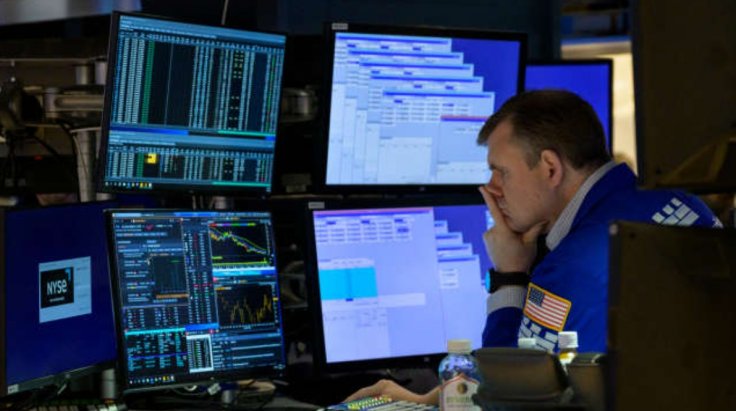Wall Street plummeted on Monday on renewed fears of the economy slipping into a recession following last week's weak economic data that showed lower than expected job additions in June and a spike in unemployment rate. The Dow Jones Industrial Average recorded its worst day in nearly two years as concerns over the economy's health sparked a global sell-off.
The turmoil started in Japan, where the blue-chip Nikkei index experienced its steepest one-day drop, plummeting 12.4%, reminiscent of the Black Monday crash in 1987. This turmoil quickly spread to the U.S., fueled by Friday's alarming jobs report and fears that the Fed was not reducing the high-interest rates quickly enough.
Wall Street Rattled

The Dow tumbled 1,033.99 points, or 2.6%, finishing at 38,703.27. The Nasdaq Composite plummeted 3.4%, ending at 16,200.08, and the S&P 500 dropped 3%, closing at 5,186.33. Both the blue-chip Dow and the S&P 500 recorded their largest daily declines since September 2022.
The mega-cap Mag 7—which includes Tesla, Amazon, Meta, Microsoft, and Google-parent Alphabet—saw a combined market value loss exceeding $650 billion.
Wall Street's "Fear Index" surged to 65.73 before the market opened, a jump of about 42 points from Friday's close. The VIX later reduced its gains and ended at 38.57, the highest level in nearly four years.
Concerns about a U.S. recession were the primary cause of the global market collapse following Friday's disappointing July jobs report. Investors are also worried that the Federal Reserve is lagging in reducing interest rates to support a slowing economy, as the central bank decided to keep interest rates unchanged at their highest level in two decades last week.

"There's no doubt that something broke in the markets last week, and it will take some time to fix the damage," said Joe Tigay, portfolio manager for Rational Equity Armor Fund.
The solution many are now advocating for is for Powell to convene an emergency Federal Reserve meeting to promptly cut rates before the scheduled meeting in September.
"I'm calling for a 75-basis point emergency cut in the Fed funds rate, with another 75-basis point cut indicated for next month at the September meeting," Wharton School professor emeritus of finance Jeremy Siegel told CNBC on Monday morning.
The Fed funds rate has stayed between 5.25% and 5.50% since last July. However, some experts minimized the likelihood of an emergency rate cut occurring.
"The Fed could ride in on a white horse to save the day with a big rate cut," said Brian Jacobsen, chief economist at Annex Wealth.
Tech Stocks Bleed
Investors continue to sell off megacap tech stocks and the previously popular artificial intelligence sector. Tech shares were among the worst performers on Monday:

Nvidia slid 6.4%, bringing its decline from its 52-week high to nearly 29%. Apple plummeted 4.8% after Warren Buffett's Berkshire Hathaway halved its stake in the iPhone maker.
Other notable declines included Tesla, which fell 4.2%, and Super Micro Computer, which gave up 2.5%.
In Asia overnight, Japanese stocks entered a bear market as Asia-Pacific investors reacted to Friday's disappointing U.S. jobs figures. The Nikkei's 12.4% loss, closing at 31,458.42, marked its worst day since the "Black Monday" crash of 1987.
The 4,451.28-point drop was also the largest in points in the index's history. On Black Monday, the Dow fell by over 22% in a single day.
Other global markets were also hit hard:
U.S. Treasury yields fell amid recession fears, as investors sought the safety of bonds. Bond prices move inversely to yields. The benchmark 10-year note yielded 3.78% on Monday, hitting its lowest level since June 2023.

Bitcoin tumbled from nearly $62,000 on Friday to around $54,000 on Monday.
Europe's Stoxx 600 fell by 2.2%.
The CBOE Volatility Index was at about 38 after peaking at 65, its highest level since the early days of the Covid-19 pandemic in 2020. Known as Wall Street's "fear gauge," the VIX index is based on market pricing for options on the S&P 500.
There is also speculation that the unwinding of the yen "carry trade" contributed to the global market decline. After the Bank of Japan raised interest rates last week, narrowing the rate differential between Japan and the U.S., the yen appreciated against the dollar, disrupting a practice where traders borrowed in the cheap currency to invest in other global assets.









